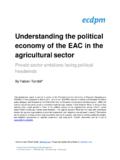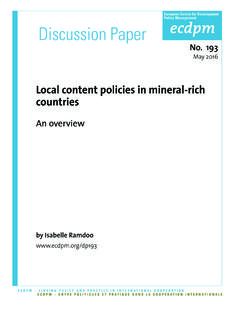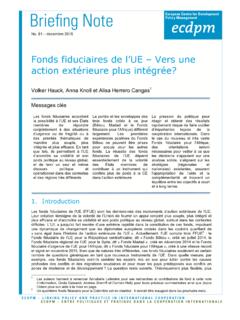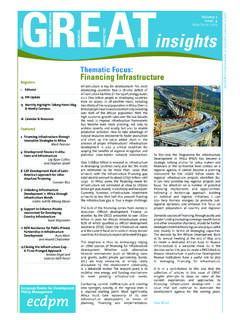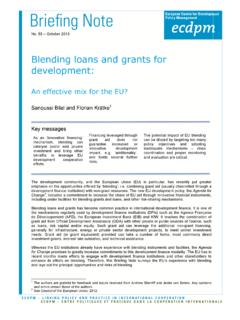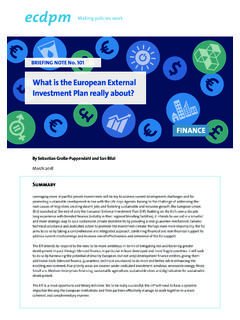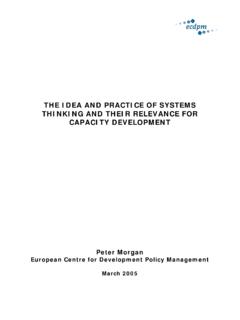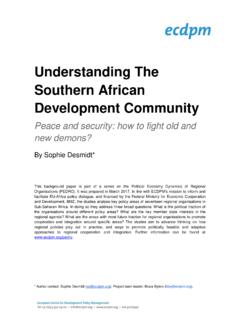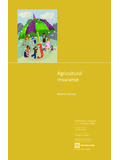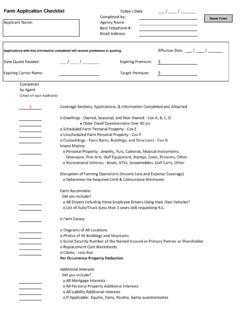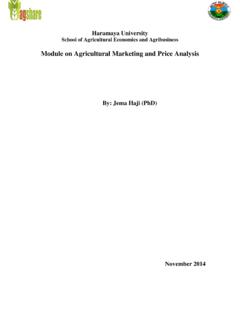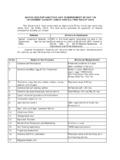Transcription of European Centre for Development Policy …
1 European Centre for Development Policy ManagementDiscussion PaperE C D P M L I N K I N G P O L I C Y A N D P R A C T I C E I N I N T E R N A T I O N A L C O O P E R A T I O N E C D P M E N T R E P O L I T I Q U E S E T P R A T I Q U E D A N S L A C O O P R A T I O N I N T E R N A T I O N A L E No. 191 May 2016 Mining and community-based agribusiness for developmentMulti-stakeholder partnerships in the gold sector in Ghanaby Alfonso Medinilla Mining and community-based agribusiness for Development Multi-stakeholder partnerships in the gold sector in Ghana Alfonso Medinilla May 2016 Key messages Multi-stakeholder partnerships, particularly those that combine commercially driven private sector operations with a more socially-grounded community-based approach, are seen as a key means for achieving the 2030 Agenda for sustainable Development , and are in high demand from the international donor community.
2 Golden Star Resources (GSR), and its subsidiary company Golden Star Oil Palm Plantation (GSOPP) in Western Ghana is an award-winning partnership that creatively aligns with the local context in rural Ghana, creating income and revenue in the communities outside the mining value chain. Physical isolation is a defining factor for partnerships in the mining sector; in the absence of a strong local government or independent civil society involvement in corporate social responsibility (CSR), communities and companies develop strategies that work but may also strengthen existing power imbalances in the communities. Agencies that wish to invest in such multi-stakeholder partnerships should look beyond the business-case of a partnership, and consider the interests and drivers of all stakeholders in these partnerships; independent facilitation of CSR can maximise the sustainability and value added of innovation in multi-stakeholder partnerships.
3 discussion paper No. 191 ii iii Table of Contents Acknowledgements .. iv Acronyms .. v 1. Introduction .. 1 Context .. 1 Approach .. 2 2. External/Sectorial factors .. 3 Traditional governance, elites and the chieftaincy 4 Criminalisation of small-scale mining.. 6 Civil society action in the mining sector and the Western Region .. 8 3. Partnership Origins .. 9 Golden Star Resources community relations and CSR .. 9 Golden Star Oil Palm Plantation (GSOPP) .. 12 Original objectives, history and phases .. 13 4. Partnership activities .. 14 5. Formal agreements and governance structures .. 17 6. The type of partnership: strategic .. 17 7. The degree of engagement .. 21 8. Conclusions and key lessons .. 22 Main findings .. 22 GSR community relations .. 22 GSOPP .. 22 Implications for Policy makers and civil society organisations .. 23 Bibliography .. 25 List of Boxes Box 1: Customary land tenure in Ghana.
4 5 Box 2: Ghana's system of mineral rent redistribution .. 6 Box 3: LOCOMS, value retention and working with the grain .. 11 List of Figures Figure 1: Sensibilisation campaign on illegal mining (left) and 'Galamsey' trying their luck on the side of the road between Bogoso and Prestea (right) .. 7 Figure 2: Galamsey miners dredge and wash ore in the Ankobra river, close to Prestea: the water quality is no longer fit to bathe and supply the town .. 7 Figure 3: GSR concession and exploration in Ghana s Western Region .. 10 Figure 4: Road on the GSOPP Bogoso Plantation (left) / Best practice demonstration lot in cooperation between GSOPP and Solidaridad West Africa (right) .. 12 Figure 5: Bogoso GSOPP Plantation - Demarcation of an individual lot (left) / Palm fruit transport (right) .. 14 Figure 6: Bogoso GSOPP field site - GSOPP field office (left) / 2016 work programme (right).
5 15 Figure 7: Different actors and their role in GSOPP .. 16 Figure 8: Records are digitised and archived at the GSOPP main office .. 17 Figure 9: Resource exchanges as part of GSOPP .. 21 List of Tables Table 1. Gold mining sector performance 1986-2007 .. 4 Table 2: Short and long-term interests (drivers) of GSOPP stakeholders .. 19 iv Acknowledgements ECDPM gratefully acknowledges the financial contribution of the UK Department for International Development (DFID), which made this study possible. The author would like to express his gratitude to all those that agreed to share their views and experiences for the purpose of this study: civil society, private sector and community representatives and individual experts. Special thanks go to Alexander Kwame Archine and Seth Asante for their contribution to the field research for this study. I also thank Philipa Varris, Robert Gyamfi and George Amankwah-Kumi from Golden Star resources and their colleagues, for agreeing to be part of this process and for providing insightful comments on earlier drafts of this study, and Sara Geenen from the University of Antwerp for her valuable feedback.
6 Finally I thank San Bilal, Bruce Byiers, Karim Karaki and Isabelle Ramdoo for their tireless support and inputs, and their help in shaping this analysis. The views expressed in this study are exclusively those of the author and should not be attributed to any other person or institution. v Acronyms BOPP Benso Oil Palm Plantation Commission on Urgent Relief and Equipment (NGO) CEPIL Centre for Public Interest Law (NGO) CMCC Community Mine Consultative Committees CRD Community Relations Department CSO Civil Society Organisation CSR Corporate Social Responsibility EPA Environmental Protection Agency GHS Ghana Health Service GIZ Deutsche Gesellschaft f r Internationale Zusammenarbeit (German Development Agency) GSBPL Golden Star Bogoso/Prestea Limited GSOPP Golden Star Oil Palm Plantation GSR Golden Star Resources LOCOMS Local Companies in Mining Services MoU Memorandum of Understanding NGO Non-Governmental Organisation NHIS Ghana National Health Insurance Scheme OIC Opportunities Industrialization Centers Ghana PPP Public Private Partnership RSA Reclamation Security Agreements SDGs Sustainable Development Goals WACAM Wassa Association of Communities Affected by Mining 1 1.
7 Introduction Context Partnerships between civil society organisations (CSOs) and business are increasingly attracting attention as part of the international Development agenda, not least with the recent adoption of the Sustainable Development Goals (SDGs) and the Finance for Development Conference held in Addis Ababa in 2015. This reflects the increasing trend in Development Policy , most notably the greater attention given to working with the private sector for Development , the relative decline in the importance of aid as a finance flow to most developing countries, and a parallel reduction in finance channelled to CSOs. Business-CSO partnerships also offer a range of potential benefits for addressing Development challenges. These relate to their potential to link commercially, market-driven investment projects and private sector know-how that can contribute to creating more and better jobs, with socially grounded, networked approaches of CSOs whose primary aim is to promote inclusive Development within a given territory.
8 But clearly there is a wide range of potential partnership forms, motivations, activities, and practices. This opens up the risk that partnership become a catch-all term with little real value added and use for Policy -makers. As much as some partnerships may offer an innovative form of operating, this must be balanced with the possibility of them failing to genuinely capitalise on the potential of operating in partnership to address socially and/or environmentally unsustainable activities. Given the growing enthusiasm from public Policy -makers to support cooperation between businesses and CSOs, there is a clear need for more analysis and in-depth understanding of the drivers and key constraints to effective strategic CSO-Business partnerships for Development . This is particularly so in the extractive sector in Africa, the focus of this paper . Building on a mapping study that looks at the literature on business-CSO partnerships more generally (Byiers et al.)
9 , 2016), this paper looks at CSO-business case studies in the extractive sector in Western Ghana and more particularly at Canadian mid-tier mining company Golden Star Resources (GSR), and its subsidiary company Golden Star Oil Palm Plantation (GSOPP). It discusses GSOPP s operations and what role GSR s community relations play into the local socio-economic context. GSOPP is a subsidiary company of Golden Star Resources that runs an expanding oil palm plantation on land that has been assigned to the company by local traditional authorities. The project seeks to provide sustainable alternative livelihoods in the catchment communities that are affected by the GSR s concession and the loss of revenue from Galamsey 1, or informal mining operations in the area. In a period of some ten years, Golden Star has developed GSOPP into a tightly run and profitable plantation, with strong regional demand for crude palm oil2 allowing for significant growth potential in the future.
10 The literature recognises GSOPP as a highly innovative project that brings together mining companies, traditional authorities, smallholders and communities around a promising agricultural value chain. From a CSR and community engagement point of view GSOPP is particularly interesting because it shows a mining company that ventures outside of its natural industrial comfort zone and invests in large-scale agribusiness in search of mutual benefits and value creation in surrounding communities. GSOPP has also attracted the attention of international donor agencies and NGOs who support the projects further Development . This case study looks at how this partnership works in practice, and what drives cooperation between company and citizens and community leaders. 1 Galamsey are artisanal miners in Ghana, they operate independently or in the form of informal groups/companies, often illegally and in a highly unregulated fashion.
